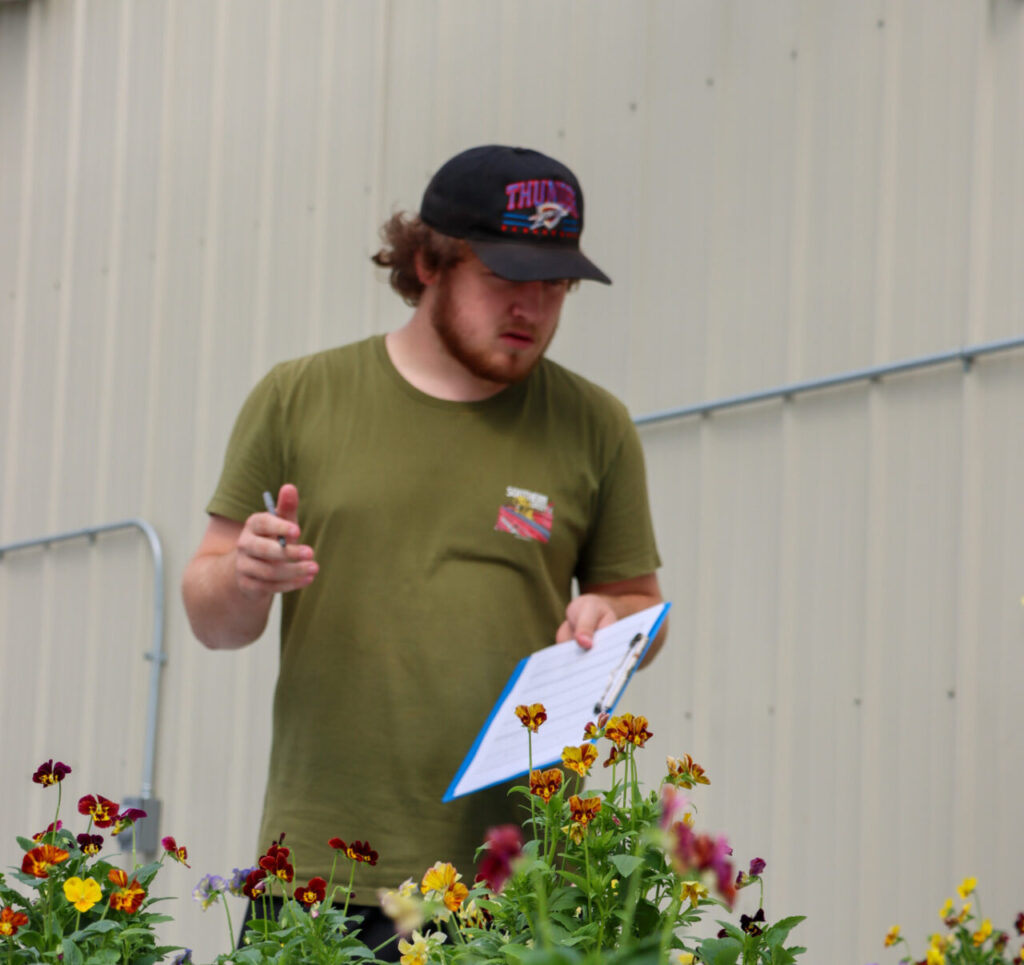The Controlled Environment Agriculture (CEA) Innovation Center in Danville, Va., is home to more than leafy greens and seasoned researchers.
It’s where students at every stage of their academic journeys contribute to research and prepare for future careers. A partnership between the Institute for Advanced Learning and Research (IALR) and Virginia Tech, the CEA Innovation Center functions year-round as both a research hub and a training ground.
“Bringing Ph.D. candidates, master’s students, undergrads and interns into the same facility is intentional. That mix is core to our mission, helping us accelerate research, build a workforce pipeline and multiply the impact of everything we do in the CEA Innovation Center.” — Dr. Scott Lowman, Vice President, Applied Research, IALR
“Having different levels of students creates a positive learning environment. Graduate students get to mentor interns, undergrads get to take ownership of projects—it’s a system where everyone learns from each other.” — Dr. Kaylee South, Assistant Professor and Extension Specialist, Virginia Tech (stationed at IALR)
Research that Matters
Students in the CEA Innovation Center support a wide range of research areas:
- Beneficial microbes to improve crop yield, vigor and quality
- Nutrient-use efficiency to reduce inputs and increase sustainability
- Disease management with biologically based tools
- Emerging crops like edible flowers, herbs (e.g., dill, fennel) and diverse microgreens
- RNAi-based biopesticides for targeted plant pathogen management in CEA facilities
- Robotics and imaging collaborations to accelerate data collection and analysis
These students leverage the expertise and capabilities of IALR’s Applied Research division, and specifically the Plant Endophyte Research Center.
Graduate Students Driving Research
Two Virginia Tech graduate students began their work in the CEA Innovation Center this year and will continue throughout their degree programs.
Colin Fite, a master’s student, started his work by refining nutrient solutions, adjusting pH and testing hydroponic systems before launching larger trials. His thesis will evaluate beneficial microbes—individually and in consortia—for potential yield and quality improvements in basil.
“My research is going to mainly focus on beneficial microbes, either individually or in a consortium.” — Colin Fite
Praveen Gajula, a Ph.D. student, is approaching his dissertation through multiple objectives spanning plant disease management, plant nutrition and microbial inoculants. He launched a significant experiment on IALR’s SMART Platform in June and plans to begin additional objectives during the academic year.
“We’re looking at ways to use microbial inoculants to improve production.” — Praveen Gajula
Gajula and Fite are both part of Virginia Tech’s School of Plant and Environmental Sciences.

Undergraduate Experience
Jacob Haymore, a recent Danville Community College graduate and current Virginia Tech undergraduate, has worked in the CEA Innovation Center for more than two years. During that time, he has supported greenhouse operations, assisted with lab projects and mentored summer interns on daily tasks. His experience has given him technical expertise and leadership skills that he will carry into his studies and career.
“I didn’t have any interest in CEA until I started working here almost two years ago,” said Haymore. Since then, I’ve started to enjoy it and enjoy the process of planning an experiment, and then the hands-on work of putting the plants out and watching them grow over time.” – Jacob Haymore
Summer Internships
Each summer, the Center also hosts interns who gain exposure to controlled environment agriculture while contributing to ongoing projects. Interns learn the scientific process—building hypotheses, collecting and analyzing data and presenting results—while also helping maintain the facility.
“I’ve been studying bacterial endophytes… you want to see some kind of growth from it, some increased yields, maybe better plant quality all around.” — Grayson Snead, Ag Tech Summer Intern
Layered Learning, Shared Outcomes
This structure—graduate students in multi-year research, undergraduates in sustained support roles and interns in shorter-term projects—creates a layered training and mentorship model. Ph.D. and master’s students mentor interns, undergrads maintain systems and share their expertise, and everyone contributes to the larger research mission.
“Each level of student is crucial. They’re key to carrying out research, contributing to outreach and maintaining our demonstration farm.” — Dr. Kaylee South
The model ensures that every level of student gains experience: interns sharpen presentation skills, undergraduates build leadership capacity and graduate students practice mentoring and project management.
Beyond the Bench: Outreach and Industry Impact
Student contributions extend outside the greenhouse. Many co-author articles for Virginia Cooperative Extension, assist with public tours and field trips and support events like the CEA Summit East, which brings together growers, researchers, suppliers and policymakers. Their involvement helps the Center function as a research facility and as a demonstration farm for new technologies and best practices.
Pathways into CEA
Whether through internships, undergraduate employment or graduate research programs, the CEA Innovation Center provides pathways for students to enter the growing CEA industry. Opportunities arise year-round, and prospective students can explore them at ceaic.org.
